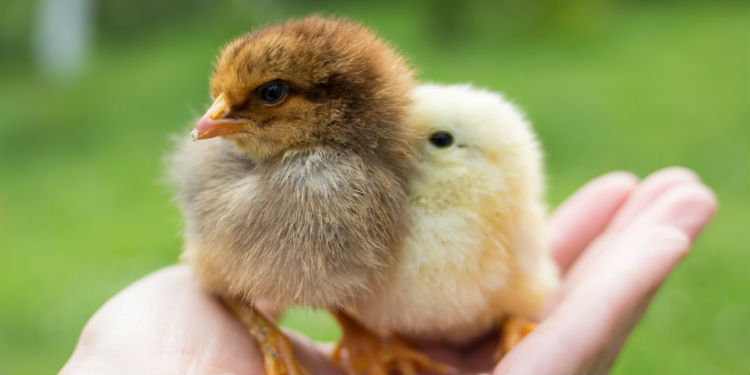
The incubation period – which corresponds to the first 18 months of life of the broiler chicks – is the most delicate time of the animal’s life, that isn’t capable to mantain its body temperature properly.
It is a common mistake to think that it’s only needed to keep the temperature under control. However, it is also necessary to watch over the water and food management. An adequate administration of those areas will be key to the uniformity and best production performance. Good broiler chicks are very active during the day, with their eyes open and shining, strong legs, no physical defect, no pathogens and presenting good immunity.
The chick isn’t capable to keep its body temperature. So, the young chick is going to lose heat faster than an adult bird.
The young chick’s body only has feathers in the lower parts, which provides a low insulating capacity. But, if the temperature isn’t controlled, it will lose heat rapidly through radiation and conduction. The aviary must be preheated and stabilized within 24 hours before the birds are placed, which can vary depending season, region and external temperature.
The right temperature will also affect the birds’ health and immunity, because the immune system development only occurs correctly if the birds are comfortable. The chick’s internal temperature (ventilation measurement) must be kept between 40º and 40.6ºC. Below 40°C is considered cold and above 41°C is considered hot. Keep using the bird’s behavior and the active temperature as an ultimate guide to determine the right temperature of the poultry.
According to the seasonal climate, it is important to have tools to warm and cool up the air, besides options to provide flow and distribution of air. Remember that the broiler chicken that are in the incubation phase don’t need air speed beyond 0,3 m/s on ground level.
In many opportunities, we see that component to be forgotten by the poultry farmers. Water is an essential nutrient that affects all the physiological functions. A water restriction in 40% decreases food digestion and body weight, specially during the first fourteen days of life. Each bird must consume 24ml of water during the first 24 hours.
The usage of water filters is very important to maintain a good quality water.
The food quantity must be 50g per bird during the initial stage of a chick’s life. The proper stimulation of the daily activities is optimal for a better food consumption and to develop the digestive and immune system, during the first 5-7 days of life.
The light intensity must be of 25 kwts in the darkest part of the house, during incubation, to stimulate the early weight increase. The ideal light intensity in ground level shouldn’t vary in more than 20%. Another good tool is having a 100 watts lamp, hung in the end of the line. After seven days, it is needed to regulate light and darkness. The number of dark hours will vary, accordingly to the market specs.
A chick must consume 20-25% of its own weight in food and 40-50% in water. These are important goals. And remember that water and food consumption are connected. The objective is to reach 40-50% of the weight in seven days and the breed standard in 14 days.
And you? Which precautions do you take in the first weeks of your birds’ life? Share with us!